Local Voice on Swine Flu
Joseph Marquette of Yellow House Farm sent out this great message about swine flu (now known as H1N1) in his latest farm newsletter. Joseph is a wonderful speaker and writer and I couldn't have said better than what he's written. Do take the time to read this and take to heart what his message is...local food is best!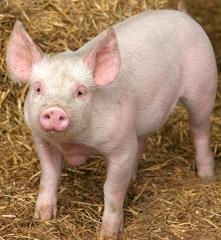
Swine Flu terrified many, and that fear was deeply saddening. Most grievous, of course, are the deaths and suffering that occurred. It was horrible to see images of masked school students and distressing to hear of little children succumbing to the sickness.
We recognize in our moments of reflection that we don't want this in our world; this is not the beauty to which we are called. This is not the celebration that life is to be. Then again, we recognize disease as naturally occurring, and the whole thing becomes a conundrum.
Still it is truly in our power to eliminate this threat. Swine Flu and Bird Flu may be naturally occurring, but these current quasi-pandemic breakouts are not. These breakouts of mass proportion are the fruit of human error, and we can stop them, if we so choose. The question is whether or not we will make this choice. Back in the early part of the 20th century farming methodologies began to abandon their sustainable roots in order to attempt to meet the demands of emerging markets. Notice I say "demands" and not "needs". In so doing they began to move toward mass-production. Mass-production quickly led to overcrowding and therewith disease breakouts. Nature, you see, always strikes a balance; we were attempting to produce outside of this balance.
Now, when we recognized that our attempts to overproduce were not going to work within the parameters of the natural world, we could have decided to submit to natural proportion, but let's face it, we're stubborn, and we like our way. As a result, we discovered new ways to block nature out of the picture. By moving our farm animals indoors, we removed them from the zone of disease exposure. This kept them from getting sick, but it also kept the from developing a healthy immune system. Thus, the move indoors was a one-way street. Still, at first, there didn't seem to be any problem, and it was a bit of a meat-eater's paradise. The price of meat went down drastically. Unnatural raising indoors allowed for 365 day availability. Cheap meat available all the time seemed great, but the Piper will be paid.
First came the undermining of the family farm. A hundred years ago over 50% of the US population was involved in agriculture; now, that number has plummeted. We no longer see our food; we no longer understand our food. The bucolic landscape that fills the American imagination as been laid low, and now when we drive about there is naught but McMansions and once fertile fields raped of all goodness.
Second came the undermining of the kitchen and meals taken together. Convenience has replaced community and we are all now abuzz with go-go-go. Faced with a whole chicken many of us don't know where to begin. We feel alienated from our dining room, which is becoming the new American Catch-All.
Third came mass insecurity about food safety and origins and actual nutritive content of our packaged foods. We eat and eat, and yet are not satisfied. We become ever more obese and yet can't stop eating. For all of this food we have no health. Cancers abound, diabetes soars, and food allergies are out of control. Still, we only joke about the words we cannot pronounce on the labels, as if, were we to stop joking, we would cry. We have lost control of our food. We don't know anything about it anymore: where it comes from, where it's been, what's in it?
Now we are faced with these flu's: avian influenza, swine flu. What's to be done? Their cause is simple: they happen because of mammoth food factories that do not respect natural proportion. That's all. We have cities-worth of chickens living inside of factory buildings that have been bred for production and not for natural vigor and strong disease immunity. They are hotbeds for disease. We have pig feedlots that number in the thousands. These are hotbeds for disease. Our demand for cheap meat is creating environments that will spawn mass disease breakouts. We could see pandemic breakouts of disease because of our communal addiction to chicken nuggets. This is insanity, and yet the cool thing about it is that it means the ball is in our court. We can stop this.
How? Two words: respect and local. "Respect" coming from the Latin "respectare" which means to really look at something. Let's really look at this problem, and let's resolve it before the next flu hits out of some other over-sized factory farm. How? Local. Only local.
- We need to restrict ourselves to animal products that come from where we live, from farmers whom we know.
- Try to only buy your meat, eggs, and dairy from farmers' markets or at the farm itself.
- If your local health department doesn't understand local food and tries to keep you from eating safe, local food, contact your elected officials immediately and ask them to intervene. No unelected official should be able to keep you from healthy food. It is your birthright to fill your pantry with goodness. When health departments create injunctions against healthy, local food they are striking out against public health. Blind faith in the USDA and FDA have brought us to our current predicament. The USDA and FDA that oversee "organic" farming support and promote food factories. "A kingdom divided cannot stand," and we seem to always get the short end of the stick.
- Try to only eat products that come from purebred heritage animals. Try to never eat from factory animals, whether raised locally or afar. Be wary of something your great grandmother wouldn't have recognized as good food.
- Be willing to pay for good things. Good food has never been and will never be cheap. If food is cheap it is not good for your body nor that of your loved ones. Treat cheap food like you would treat poison. Consider, just like cigarettes, somebody is earning a buck and a pension on convincing you and your family to consume their unhealthy.
- If we do this, our efforts to abstain from unhealthy will automatically regulate the food industry. We must realize that our government is not going to do it; so we must. By simply refusing them our money, we will encourage them to reduce production and limit herd and flock size. This is the only way for us to ever rein in the public health risk that is industrial food.
- Without rancor, without resentment, we simply abstain and celebrate a local, healthy life.



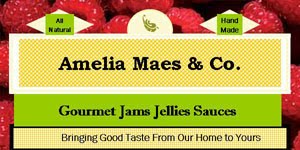
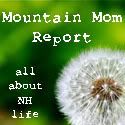

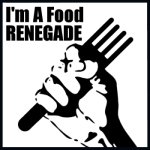





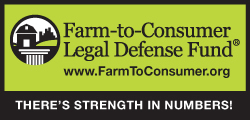
1 comments:
Joe is so eloquent. I'm going to copy and paste this an e-mail it out to a few friends and family.
Post a Comment